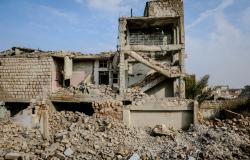Hegel on the Hudson: Why the End of the End of History spells trouble for the United Nations

Michael Bröning argues that it is increasingly unclear how the United Nation's global governance ambitions can be squared with the fragmenting political reality.
Figuratively speaking, every shell fired at Ukraine explodes twice. Once in the villages and towns of the Donbas and once at the heart of the rules-based international order. While the military outcome of the war remains difficult to predict and its impact on the global order is ultimately dependent on the relative success (or failure) of Russia’s aggression, the consequences for the United Nations are already plain to see: The UN’s future is likely to be one of increasing dysfunctionality and an ever-widening gap between rhetoric and realpolitik.
How Many Divisions does the UN have?
While it always remained doubtful whether the world organization would play a decisive role in stopping the war, at least some meaningful contribution appeared at first plausible.
The Security Council met in all-night emergency sessions; the General Assembly even re-activated a “Uniting for Peace” formula not used in 40 years becoming a forum for the widespread condemnation of Russian aggression. For a short moment at least, the UN captured the diplomatic voice of the world.
As the war grinds into its fourth violent month, however, even the busiest corridors in New York cannot conceal the harsh reality that the United Nations’ ability to act in response to great power confrontation is and has always been limited. How many divisions does the UN have? Once again, it seems, far too many.
A long overdue visit of the Secretary General to Ukraine brought about little more than an additional round of shelling. And while UN-agencies on the ground have engaged in life-saving humanitarian assistance, the few political contacts to speak of have taken place under the aegis of the Turkish autocrat Erdogan and the government of Israel. It is rather telling that the absence of the Good Offices of the UN Secretary General from the short list of diplomatic initiatives has barely raised an eyebrow.
In response and frustration, some activist voices (encouraged by Kyiv) have openly called for altering Russia's status at the UN, taking aim at the country’s position on the Security Council or – most recently – at the Russian role in the Food and Agriculture Organization (FAO).
Against the backdrop of Russia’s exit from the Council of Europe, its suspension from the Human Rights Council and (Russian) talk of leaving the WTO and the WHO, such drastic notions are gaining more traction than otherwise would be expected.
As history recalls, even the hapless League of Nations managed to expel the Soviet Union after its aggression against Finland in 1939.
But as understandable as such considerations may be, they are unrealistic– at least when speaking about the Security Council. As a permanent member, Russia must agree to any fundamental change. Therefore, attempts to radically alter the rules of the game are as improbable today as they have been for decades.
Modest and more technical attempts at change – as the recently adopted Liechtenstein Initiative to force an automatic General Assembly debate whenever a veto is used in the Security Council – are and remain possible. However, they have the distinct disadvantage of being mostly cosmetic.
It is often lamented that the UN – contrary to the fictional German Baron of Lies Karl Friedrich von Münchhausen – remains incapable of pulling itself out of the swamp by its own hair. Proponents of drastic change, however, should be careful what they wish for.
Since its inception, the Security Council and the veto served to prevent a direct confrontation among the world’s largest powers. Against this backdrop, it seems doubtful that a UN largely cleansed of authoritarian member states would be in a better position to do so. Would punishing Russia not necessitate similar actions of moral purification regarding North Korea, Iran, or Saudi-Arabia? This, however, would give rise to the question of the purpose of a global organization that is global in name only.
The Future? Just like the past – only worse
At this point, a realistic scenario for the future of the United Nations seems to be a return to structural blockades analogue to the decades of Cold War. Thus, the future could look a lot like the past – only worse and more dire as overlapping global crises inevitably require global attention.
In practice, this is likely to translate into sporadic cooperation on questions of common concerns and attempts to use the UN as a court of world opinion.
While some of this may sound eerily familiar, the actual balance of cooperation and dysfunctionality will ultimately depend on whether Russia will play a disruptive role outside of Ukraine and on the stance China will take in this constellation.
Consequences will be anything but abstract. On the operational level, a list of peacekeeping operations and diplomatic missions in conflict hotspots from Libya to Syria, and Iran to North Korea depend on this question.
More optimistic UN-watchers rightly point out that in the last decade – as during the Cold War – the UN has regularly succeeded in cooperating on individual issues despite existing tensions.
If the past is a reliable guide – so the argument goes – such a compartmentalizing approach remains possible and would suggest the continuation of cooperation on overarching goals, certain peacekeeping operations, and perhaps even a modest diplomatic role for the UN in managing second-rate conflicts. While all of this seems possible; it is unclear whether this will be likely in a world where relations between Security Council members border on active military confrontation. After all, successful compartmentalizing at the UN has historically been more of an exception than a rule.
As a consequence, unless a grand bargain brings Russia back into the global community, the UN will have to relegate itself to a role as the world's emergency response team, waiting for the powers that be to grant (or refuse) access to scenes of humanitarian disasters.
In the process of carving out a meaningful future role for the UN beyond humanitarianism, leading voices from within the organization have recently suggested new responsibilities. In a world seemingly ridden with ubiquitous “misinformation” such ideas have included suggestions for the UN to embrace a role as international arbiter of truth. In this vision, the UN’s focus would shift from the prevention of wars to the arbiter of info-wars.
UN-Secretary General Guterres has personally and repeatedly warned of an “epidemic of misinformation”. While encouraging social media users to check the source of sharable information as recently promoted by a prominent UN-campaign is a step forward, there are reasons to curb the enthusiastic enlisting of the organization in the comprehensive struggle against misinformation.
Data and facts – including the scientific consensus – are often more multi-facetted and less monolithic than intergovernmental boards or official communiqués can allow for. And this is not to mention the problem that establishing the UN as an adjudicator of objectivity seems almost blissfully ignorant of the scandalous positions taken by an organization that is inherently incapable of insolating itself from political contestation.
Global Governance and the End of History
While one could argue that the emerging “UN-lite” is not too different from the one originally envisioned in the UN-Charter, it certainly differs from the role the UN has played since the end of the Cold War.
US-political scientist Francis Fukuyama’s “End of History”, inspired by Hegelian notions of dialectic progress, was after all not an end for the United Nations, but a beginning. In the 1990s, it seemed that rational progress was not only possible but also ideologically inevitable. For the UN there was finally light at the end of the tunnel.
It is no coincidence that the United Nations' most comprehensive engagement with global challenges such as climate change and poverty took shape in the period immediately after the end of the Cold War.
In June 1992, the Rio Summit adopted the first comprehensive action plan for sustainable development. In 2000, the Millennium Declaration proclaimed eight development goals as a common guideline for global action. Finally, in 2015, under the aegis of the UN, the global community agreed on the “2030 Agenda for Sustainable Development”: 17 development goals and an impressive 169 sub-goals – from groundwater protection to the primary education of school children – were launched to steer the actions of the global community onto one common path.
Ever since the formulation of this impressive agenda, the UN’s focus on global governance has only further increased and today encompasses virtually every aspect of the complex net of overlaying global – and regional – challenges – at least in rhetoric.
Many progressives consider the 2030 agenda an almost self-evident global expression of enlightened reason. And given that the SDGs were unanimously adopted by all 193 UN member states, they certainly do carry moral and strategic weight. This, however, does not separate them from historical contingency.
Viewing political projects such as the 2030 agenda as virtuously disconnected from power-structures and the conditions that brought them into existence is a rather ahistorical reading of how global standards are being set. And even more concerningly, such a perspective does not prepare advocates of the agenda for the struggles that lie ahead.
For despite the universalist language and its determination to look ahead, the 2030 development agenda is surely also a political manifestation of the unique unipolar moment of the past. After the fall of the Iron Curtain, the political momentum was strong enough to put these aspirations on paper. But will this momentum be sufficient at the End of the End of history?
The current drastic global disruptions have clearly stifled calls to action. While the Corona pandemic certainly hampered the possibility of achieving these goals, the war makes the implementation even more unlikely. Countries will cut development spending and increase defense budgets, as they grapple with their own economic uncertainties. And irrespective of public pronouncements, precious and limited political capital is likely to be diverted from long-term development questions to acute economic and military crisis management – last but not least regarding the emerging food crisis.
Despite this, and perhaps inevitably, the UN-leadership and its ideological resonance board have remained committed to – or trapped in – the organization’s bold rhetoric.
Last year, Secretary General Guterres presented an 85-page vision of the UN’s future. Under the programmatic title Our Common Agenda, the document invokes the idea of cooperation “as a global family”. The vision calls for a “global immunization plan”, “bold steps to address climate degradation”, a “new social contract between governments and their citizens”, the “transformation of education, skills development and lifelong learning”, a “multi-stakeholder dialogue on outer space”, and a “global digital compact” – to name but a few of the far-reaching goals.
To further promote this agenda, Guterres recently announced the establishment of a “High level Advisory Board on Effective Multilateralism”. This new board is charged with elaborating further ideas for global governance "from climate protection to sustainable development, the international financial architecture to the interests of future generations".
Obviously, ambitious goals are legitimate and, in many ways, the discrepancy between the normative framework of the UN’s founding documents and the real world is as old as the organization itself. But it is increasingly unclear how global governance ambitions can be squared with the fragmenting political reality and without losing the UN in the ever-widening gap between ambition and reality.
The United Nations were founded to save succeeding generations from the scourge of war. In the words of its second Secretary-General – proudly displayed on the walls of the Secretariat in New York to this day – it “was not created to take mankind to heaven, but to save humanity from hell”.
Today, as the world is faced with escalating tensions and violence not seen in decades, responses from within the UN circle largely around reflexes to stay the course.
History has returned to the battlefields of the Donbas. But one may be forgiven to think that the End of History lingers on in the more enthusiastic strongholds of Western multilateralism. Between the Hudson and the East River of New York, it seems, Hegel is still very much alive.
Michael Bröning is the Executive Director of the Friedrich-Ebert-Stiftung (FES) New York Office. Michael holds a Doctorate in Economics and Social Sciences and a MA in history. He has taught Political Science at the Freie Universität in Berlin and was a John F. Kennedy Memorial Fellow at Harvard University. He is the founding editor of Internationale Politik und Gesellschaft, a tri-lingual political magazine, serves on the basic value commission of Germany’s Social Democratic Party, and is the author, most recently, of Vom Ende der Freiheit (Dietz, 2021).
Photo by Ahmed akacha


